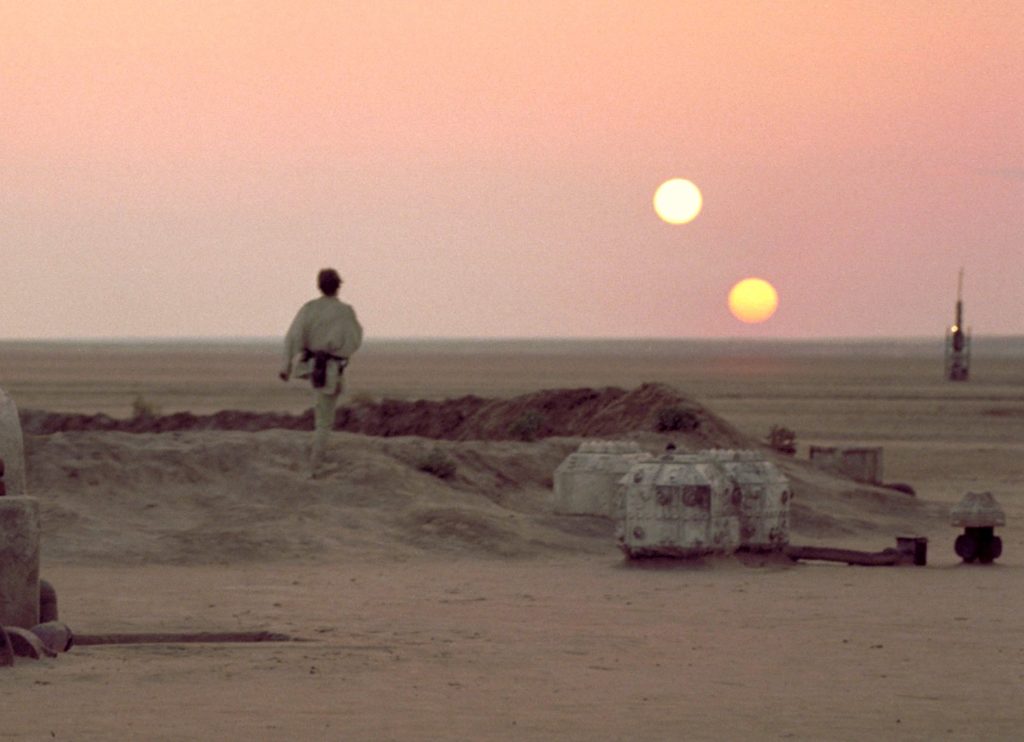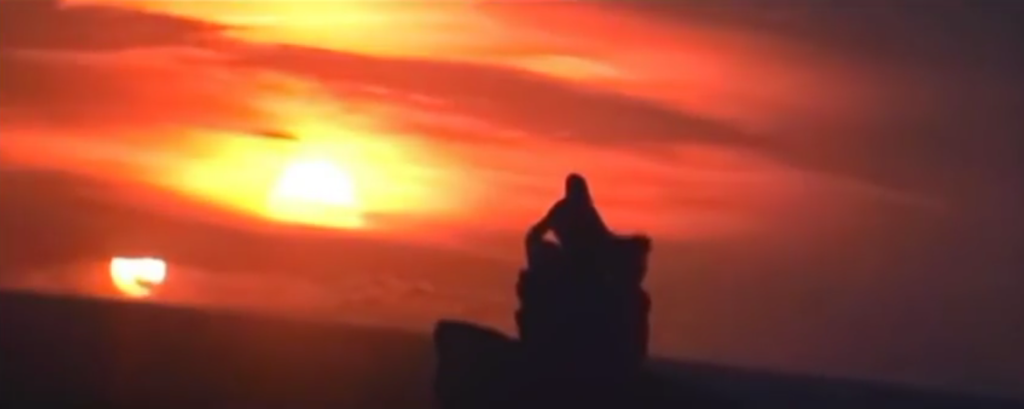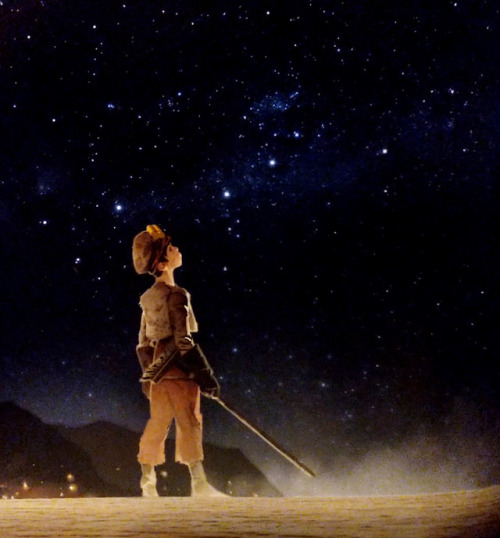Luke Skywalker was my childhood hero. Back then, I admired him for his adventurousness, bravery, and victory. Now as an adult, I admire him for his philosophical integrity. Here’s why.
In A New Hope (1977), Luke is a farm boy. An orphan. A kid of no special importance. So was I, so it seemed to me at the time: a kid growing up in a small town, far from the centers of power in my society, and the target of most of my school’s bullies. Like my hero, I dreamed of adventure in faraway places.
Then Luke finds himself thrust into an adventure of galactic significance: helping save a princess, and blowing up a WMD. In the course of the adventurer he discovers The Force, a quasi-religious power which “surrounds us, penetrates us, binds the galaxy together” — and Luke achieves his victory by letting the Force flow through him.
There was a spiritual message there. As I understood it back then, it went something like this: the galaxy as a whole is almost a living thing, and you are part of it; and you can know this by relaxing, calming yourself, trusting your feelings, visualizing relations of energy between and within things, letting go of hate and anger. Chilling out. Meditating upon peace and purpose.
That is a Taoist message:
A skillful fighter does not become angry.
A skillful conqueror does not compete with people.Tao Te Ching, § 68
Now, I didn’t know anything about Taoism when I was six years old, but I got the message.
I suppose this is no accident. Star Wars was based (in part) on those spaghetti Samurai films from the ’50s and ’60s, in which similar messages are encoded in the ethical principles embodied therein. Bruce Lee taught something like it, in Enter The Dragon (1973), so the idea wasn’t wholly new to cinema-goers.
Later in my life, as an undergrad, I read the Tao Te Ching. And because I had been watching Star Wars through my childhood (as well as listening to The Beatles and The Moody Blues), I found its message rather familiar.
There’s already enough stuff written about how The Force is comparable to the Tao, so I’ll skip it here; I want to emphasize the way in which Luke himself is a kind of Taoist hero. Which leads me to the Return of the Jedi (1983). At the opening of this film, Luke is no longer a farm boy. Now he’s a Jedi Knight. He’s a somebody. He’s marching into Jabba’s palace through the front door. He’s pushing around the guards, force-choking them like a Sith, controlling their minds, taking no crap from anyone. He tells Jabba what he intends to do. Jabba and the whole court laugh at him. Then he does it. Exactly as he said he would do.
And he does no more then exactly what he said he would do, because:
A good general achieves his purpose and stops,
But dares not seek to dominate the world.
He achieves his purpose but does not brag about it,
He achieves his purpose but does not boast about it,
He achieves his purpose but is not proud of it,
He achieves his purpose but only as an unavoidable step.Tao Te Ching, § 30
Luke’s heroism, and his Taoism, hit home the most for me in the emperor’s throne room scene. Here’s a character who is doing his absolute best to keep his cool, while Vader and the Emperor push all his buttons. When Vader suggests that Leia could be turned to the dark side, Luke finally gives in to his anger. And so he defeats Vader. But then he sees how he was becoming like Vader, in the symbol of the mechanical hand– something he had been warned might happen when he was exploring the cave on Dagobah. So he throws away his lightsabre– an astonishing act of bravery and integrity. That’s the Taoist way. To do nothing, and so to achieve everything. He looked into the dark side within himself, and at the last minute he pulled himself back from it, and refused to act; that is, he refused fight in the the expected, antagonistic way.
Act without action,
Do without ado,
Taste without tasting.
Whether it is big or small, many or few, repay hatred with virtue.It is precisely because he does not compete that the world cannot compete with him.
For deep love helps one to win in the case of attack,
And to be firm in the case of defense.Tao Te Ching, § 63, 66, 67.
It’s possible that Luke was also trusting that his father would find the goodness still within him (which Luke had told him, a few scenes ago, was still there), and so come to the rescue of his son. It is also a Taoist idea to see the good in all things, including in what is dangerous or harmful.
Even when a man is bad, when has Tao rejected him?
Tao Te Ching, § 62.
Some Taoist texts which discuss this life-affirming point of view do so in the context of death:
Tzu-lai fell ill, was gasping for breath and was about to die. His wife and children surrounded him and wept. Tzu-li went to see him. “Go away,” he said. “Don’t disturb the transformation that is about to take place…
Tzu-lai said, “Wherever a parent tells a son to go, whether east, west, south, or north, he has to obey. The yin and yang are like man’s parents. If they pressed me to die and I disobeyed, I would be obstinate. What fault is theirs? For the universe gave me the body so I may be carried, my life so I may toil, my old age so I may repose, and my death so I may rest. Therefore to regard life as good is the way to regard death as good.”
Chuang-Tzu, The Great Teacher.
Sounds like what Yoda was telling Luke, when Yoda himself was dying.
So, on to The Last Jedi (2017).
It’s not really Luke’s story; the title is ambiguous enough that it could refer to Luke, although it could also refer to Rey. But as for Luke himself, we learn through the course of the film that he looked into the darkness within himself a second time. In so doing, he almost killed his nephew Ben Solo. Then he pulled himself back from the darkness, and turned again to the light.
But that second time, that brief look to the dark and return to the light does no one any good. In fact it does deep harm to several people he cares about. No wonder that through most of the film, he’s bitter and miserable, full of self-hatred. He is a good enough man to know that he failed, and he is a good enough man to know that he should have been a better man. (A private note: I know what that feels like.) Luke isolated himself on the island so that he would do no harm to anyone else, ever again. He intends for himself to be the last Jedi: as he tells Rey, “The Jedi must end.”
It takes Yoda, who has died / become one with the Force, to prompt him to live in the present moment again and to do something decisive to help his friends, instead of uselessly dwelling on the past. So reminded of what matters, he confronts Kylo, not to kill him, but to apologise. And in so doing, to show Kylo there is still a chance to turn back to the light. And he does so again in the most Jedi possible way: using his powers for knowledge and defence, not for attack, exactly as Yoda taught him. He faced Kylo to teach him: and that, too, is a Taoist thing to do:
The good man is the teacher of the bad,
And the bad is the material from which the good may learn.Tao Te Ching, § 27
And at the same time, he gives his friends in the Resistance a chance to escape. It’s similar to how he played for time for his friends while facing the Emperor on the second Death Star, after all.
Luke survives the encounter because he is not really there. He has:
…become one with the dusty world.
This is called profound identification.
And therefore:
The wild buffalo cannot butt its horns against him,
The tiger cannot fasten its claws in him,
And weapons of war cannot thrust their blades into him.
And for what reason?
Because in him there is no room for death.Tao Te Ching, § 56, 50
Or, as in the context of the film, he scrounged up the last drops of will and energy he had, to astral-project himself to another planet– probably the most awesome thing we’ve ever seen a Force-sensitive character do in all the films and spinoff TV shows.
It costs him his life. It’s a truly great moment of heroic self-sacrifice. But he does not really die; he passes into the Force, with peace and purpose, as Yoda and Obi-Wan (and possibly Qui-Gon Jinn) had done before him.
It’s a Christian idea, the idea that everyone can be forgiven, no matter what they’ve done. But it’s also a Taoist message, the idea that everyone can guide their life in accord with the Tao, let go of their anger and their hate, even to the point of letting go of their life, and in so doing accomplish greatness. No matter who they are.
So, now we have a Star Wars cinematic world in which there are no more special bloodlines or aristocratic families. No more knights saving princesses. As Luke says, the Force belongs to everyone. So any of us, even a slave-boy who cleans animal pens all day, can be a Jedi. The galaxy has become more democratic. And I think that is a new source of hope.
It’s this sense of new hope which allows Luke to tell Kylo, and the audience, that he will not be the last Jedi after all.
There is another.
Quotations from the Tao Te Ching, and from the Chuang-Tzu, followed the translation which appears in “A Source Book in Chinese Philosophy” by Wing-Tsit Chan (Princeton, 1963).




One Response to Luke Skywalker: A Hero of Peace And Purpose